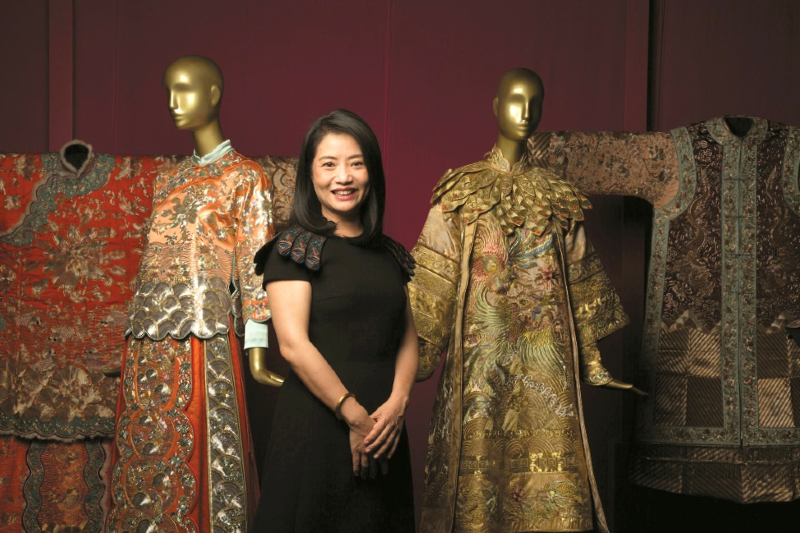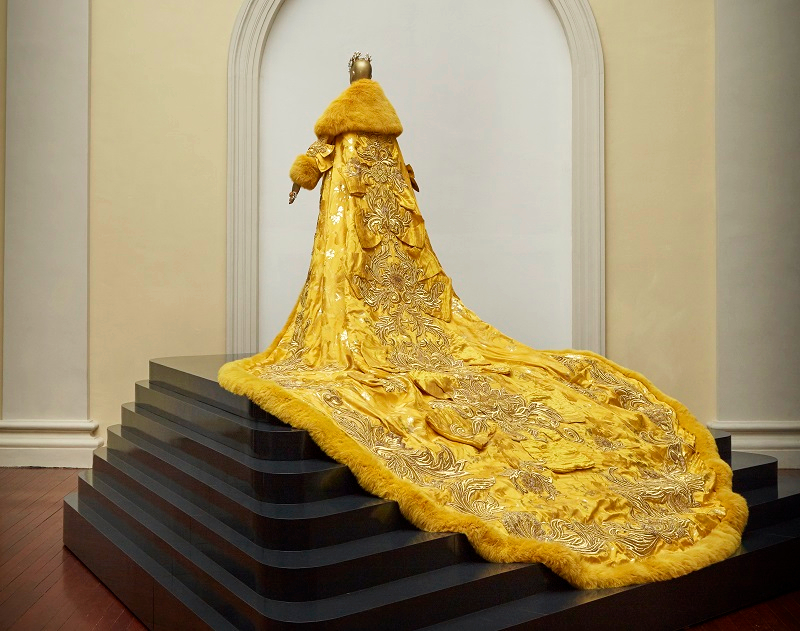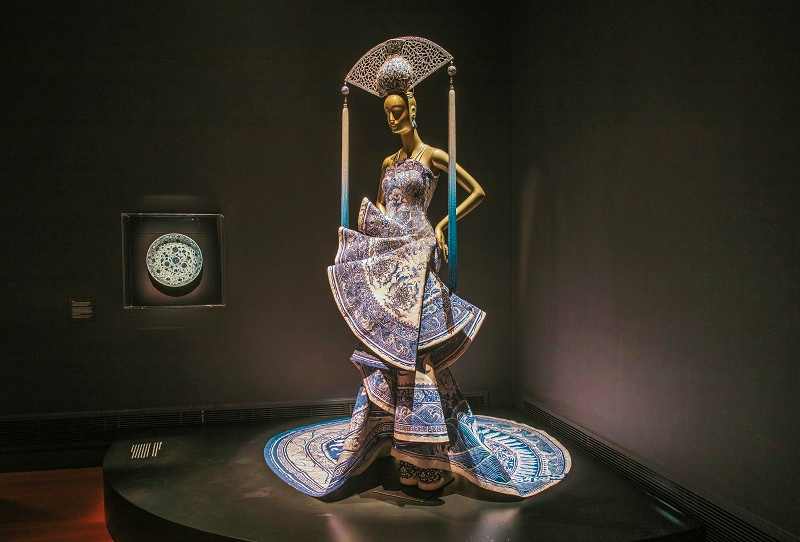
The Da Jing (Magnificent Gold) gown that took 50,000 hours to make (All photos: Russel Wong for the Asian Civilisations Museum)
Whether fashion designers can be considered artists has long been argued, with strong opinions on both sides. But then, there are the rare few, bestowed with such talent — along with the intrepidity to unleash it — that the (typically) declamatory use of “art of couture” becomes literal when describing what they do.
A case in point is designer Guo Pei, the Chinese couturier who seems to break all the rules when it comes to capturing the zeitgeist of fashion. That is to say, she eschews the need to follow trends, steadfast in the sheer audacity of her creations. Yet, even those who may not admire the couture brand this designer is known for, would not deny her “prodigious imagination”, as The New Yorker contributor Judith Thurman wrote in 2016.
gp1.jpg

The story of Guo’s arrival on the global stage is one that has been retold to folklore status, by all accounts unanimous in the exact timeline it happened — during the 2015 Met Gala. Specifically, on the famed red-carpeted steps of the New York Metropolitan Museum of Art, where the who’s who of celebrity-dom parade themselves for the annual fundraiser held to benefit its Costume Institute. That year, while two of the designer’s works were included in its China-themed showcase, it was Barbadian R&B superstar Rihanna who introduced her en masse, when she stole the show by regally walking up MoMa’s grand steps in one of Guo’s designs.
The costume — a four-metre-long yellow gold silk cape with gold-spun and silver metal thread embroidery, lined with similarly dyed fox fur, and weighing all of 25kg — currently sits at the upstairs foyer of the Asian Civilisations Museum in Singapore.
As if reiterating the West’s “discovery” of her, the now iconic and much-lampooned (for resembling an omelette, according to the strange world of the internet) gown marks an apt introduction to the designer in Guo Pei: Chinese Art & Couture, an exhibition showcasing 29 of her most intricate gowns. The showcase’s curation draws a correlation between her popular motifs and inspirations to Chinese historical artefacts. Also highlighted are chosen works from her bridal range that referenced Peranakan culture, inspired by her visit to Singapore years ago.
yellow_queen.jpg

Venturing beyond the yellow cape gown, a dim and rather cosy space draws us into a universe that conversely reveals vast and exquisite worlds within. Through it, we step into a manifested realm of Guo’s imagination that, while visually frenzied, suspends the need to care for order at all.
The idea of function and fashion, and the debate on her merits as a fashion designer — some would regard her as a costumier, her success an anomaly in this day and age of post-Karl Lagerfeld contemporary fashion — all remain outside of this universe. Here, there is only the need to abandon ourselves to the vision of the artist and, ultimately, to immerse ourselves in the extravagance in which she realises her vision.
It is a world marked by the thousands of hours it takes to create just one gown — one with 3,000 hours of work earns a “just” prefix by our guide. Others required 10,000 to 50,000 hours of stitching by an army of seamstresses. We probe her love for gold, which is a reaction to the austerity of being a child of the Cultural Revolution; her curious visualisations of her oriental heritage that border on exoticism, perhaps thanks to her grandmother’s stories of the imperial household and what they would wear.
We marvel at pieces of beauty crafted with wild creativity and a lack of inhibition, grand creations imbued with a heady amalgamation of whimsy, romanticism and feminine power.
In the 50kg “Snow Queen” gown and cape first worn by 78 year-old American model Carmen Dell’Orefice — one of her key muses — there is a sense of regal nobleness that Guo often alludes to.
She conceives the essence of it in silk, always silk, and regularly with a combination of mesh, gold and silver threads, crystals, gems, beads, sequins, pearls, Swarovski crystals and fox fur. In others, she expresses feminine virtues in floral designs typical of traditional Chinese culture. Motifs of the dragon and phoenix are played up in the more flamboyant pieces, which can come across as stereotypically lacking in finesse.
miss_china.jpg

But from the breathtaking porcelain dress worn by Miss China during the 2012 Miss Universe competition to the magnificent “big gold” first shown in her 2006 Samsara Collection that took a whopping 50,000 hours to make, or even one of this writer’s personal favourites, a gold and fuchsia gown resembling a “basket of flowers” with the most stunning fan-out hand-pleated skirt of embroidered peonies and gold waves, Guo’s deftness at walking the tightrope between grandeur and ostentatiousness may just be her greatest weapon. They are gowns you can both appreciate from afar and scrutinise up close — for the most part, bold and spirited without tipping over into mere spectacle.
Undeniably, it is in the “quieter” pieces that the beauty lingers. One would be a 2017 metallic-paper fine pleated skirt and top ensemble, inspired by the baroque cathedral of Saint Gallen in Switzerland that is part of Guo’s so-called East-West hybrid designs. It surprises for both its simplicity and contemporary touch, even if it remains within her language of design. The other is a 2012 floral cheongsam from her traditional bridal gown series, inspired by the beaded slippers she saw in the Peranakan Museum of Singapore. Fully embroidered with coloured crystals and pearls, the ankle-length slim silhouette piece with a tall collar — an ode to the style of the 1930s — is a delight, tastefully showcasing Guo’s floral work at its best.
Drawing from her motto —“If you love beauty, you love life”— the celebration of an unabashed love for beauty can transcend personal preferences and differences. If there is one thing Guo can teach us, it is the freedom to revel in it.
'Guo Pei: Chinese Art & Couture' is on until Sept 15 at the Asian Civilisations Museum, 1 Empress Place, Singapore. Admission for foreign residents and tourists is S$20. For more information, see here.
This article first appeared on Aug 26, 2019 in The Edge Malaysia.


